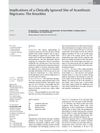TLDR Acanthosis nigricans is a skin condition that may indicate a higher risk for insulin resistance and type 2 diabetes, and more research is needed to understand and treat it.
The document from 2018 discusses Acanthosis nigricans (AN), a skin condition linked to obesity, insulin resistance, and metabolic syndrome, with varying prevalence among ethnic groups. AN serves as a clinical marker for identifying patients at risk for insulin resistance and type 2 diabetes, but its correlation with these conditions requires further study. The classification of AN includes obesity-associated, endocrinologic, monogenic, multigenic, paraneoplastic, drug-induced, and indeterminate subtypes, with specific syndromes like HAIR-AN syndrome also mentioned. Treatment options like retinoids and metformin show promise, but controlled studies are lacking, and the impact of lifestyle changes on AN is not well understood. The document highlights the need for large-scale studies to validate AN as a predictor of insulin resistance or type 2 diabetes and suggests research into insulin/IGF-1 and other signaling pathways to improve understanding and treatment of AN.
 53 citations
,
December 2015 in “JAMA Dermatology”
53 citations
,
December 2015 in “JAMA Dermatology” Women with PCOS often have more body hair, acne, and skin darkening, and these signs are linked to metabolic issues like insulin resistance and high cholesterol.
 99 citations
,
December 2010 in “Journal of The European Academy of Dermatology and Venereology”
99 citations
,
December 2010 in “Journal of The European Academy of Dermatology and Venereology” The document concludes that certain genetic mutations and dietary factors are involved in acne development, and treatments like isotretinoin and diet changes can help manage it.
 9 citations
,
October 2014 in “Experimental and Clinical Endocrinology & Diabetes”
9 citations
,
October 2014 in “Experimental and Clinical Endocrinology & Diabetes” Knuckle Acanthosis Nigricans is common in Latin American youth and may indicate early insulin resistance, especially in those with normal weight.
 27 citations
,
December 2016 in “Dermatology and Therapy”
27 citations
,
December 2016 in “Dermatology and Therapy” Certain skin conditions can indicate insulin resistance and should prompt lifestyle changes and medical treatment to manage underlying health issues.
 19 citations
,
January 2005 in “Paediatrics and Child Health”
19 citations
,
January 2005 in “Paediatrics and Child Health” Metabolic syndrome in kids and teens is linked to obesity and increases diabetes and heart disease risk; early lifestyle changes are crucial for management.
 28 citations
,
November 2007 in “Medical Clinics of North America”
28 citations
,
November 2007 in “Medical Clinics of North America” Obesity worsens Polycystic Ovary Syndrome symptoms, and weight loss is a key treatment.
 1 citations
,
May 2022 in “IntechOpen eBooks”
1 citations
,
May 2022 in “IntechOpen eBooks” Obesity leads to physical, metabolic, reproductive issues, higher healthcare costs, and mental health problems.
 July 2015 in “Cambridge University Press eBooks”
July 2015 in “Cambridge University Press eBooks” The document concludes that careful history and physical exams are crucial for accurately diagnosing polycystic ovary syndrome and distinguishing it from other similar conditions.








